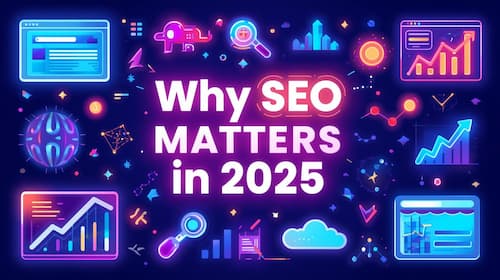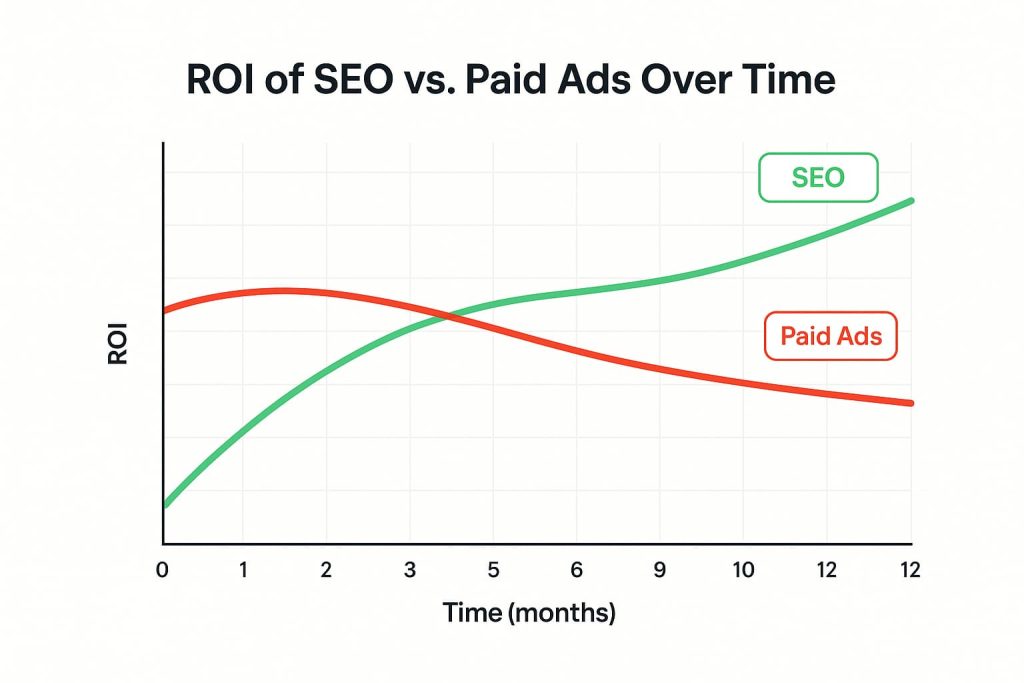Introduction
Is SEO important, and does it matter in 2025? The answer is yes! If only it’s done the right way. Today’s SEO is no longer about stuffing keywords or buying spammy backlinks. Instead, it’s about strategy, patience, and quality. Let’s explore why SEO is important and matters in 2025, what’s working now, and how small businesses can harness it for long-term growth.

The Evolution of SEO: Why It Still Matters.
SEO has come a long way from keyword stuffing and backlink schemes. In 2025, it’s about trust, authority, and user experience. Nearly 70% of online journeys begin with a search engine (HubSpot), making SEO a cornerstone of digital marketing.
Why SEO Matters in 2025
- Visibility & awareness: Ranking high builds recognition and credibility.
- Traffic: The top 3 Google results still capture the majority of clicks.
- Conversions: Organic content nurtures buyers at every stage of the journey.
- Cost-effectiveness: SEO traffic is cheaper and more sustainable than paid ads.
What Works Now: Modern SEO Strategies.
Small businesses and startups can’t rely on outdated tricks. Here’s what works in 2025:
1. Audience Research
Go beyond guesses—use surveys, social listening, and keyword research to understand real customer needs. Tools like SEMrush or Google Trends help you spot demand.
2. Expert Input
Work with subject-matter experts to create authentic, trustworthy content. Google’s E-E-A-T framework (Experience, Expertise, Authoritativeness, Trustworthiness) rewards this.
3. Unique Data and Angles
Stand out with original surveys, customer stories, or case studies. Example: A fitness startup publishing client progress studies to rank for “real weight loss results.”
4. Strong Content Structure:
Clear, engaging, scannable content improves readability and reduces bounce rates.

Real-World Proof That SEO Works
Case Study 1: Local Hotel
A Mombasa-based hotel saw a 220% increase in organic traffic after optimizing for local search queries like “Hotels in Mombasa” (Semrush).
Case Study 2: E-commerce Brand
An online peanut butter store boosted revenue by 40% in one year with long-tail keyword targeting and blog-driven SEO (WooCommerce).
Case Study 3: Healthcare Provider
A regional clinic improved patient bookings by 35% after focusing on local SEO and fast, mobile-friendly site design (Moz Industry Report).
Common Objections and the Truth
“SEO is too expensive.” Quality SEO costs money, but it’s still cheaper than PPC long-term.
“It takes too long.” True, results take 6–12 months, but the compounding growth is unmatched.
“AI will kill SEO.” AI enhances search but doesn’t replace businesses offering real products and expertise.
“It’s too competitive.” Small businesses can still win with local SEO and niche targeting.
When to Prioritize SEO vs. Other Strategies
SEO isn’t always the priority.
Prioritize SEO if:
- Your audience searches for your product/service online.
- You’re building a long-term marketing foundation.
- You can invest in content consistently.
Hold off on SEO if:
- You need immediate results (ads may work better short term).
- You haven’t defined your target audience yet.
- You lack the resources to produce ongoing content.
The Long-Term Value of SEO
Unlike ads that stop when your budget ends, SEO delivers compounding returns:
- Sustainable traffic that builds over time.
- Higher ROI compared to paid advertising.
- The brand enjoys stronger credibility and trust due to this approach.

Why SEO Is the Solution in 2025
With the right strategy, patience, and execution, it’s one of the most cost-effective ways to drive traffic, build trust, and grow revenue.
Data shows its impact: over 53% of web traffic comes from organic search, and Google dominates more than 90% of it. Ignoring SEO means missing out on visibility, leads, and credibility.
Core Benefits
- Lower customer acquisition costs compared to paid ads.
- Stronger brand trust and authority from higher rankings.
- Tangible results—organic traffic, conversions, and long-term growth.
What Works in 2025
- Keyword research tailored to customer intent.
- On-page optimization (titles, headers, meta, alt text).
- Link-building for authority.
- Local SEO tactics like optimizing Google My Business and managing reviews to drive in-store traffic.
Balancing Ads and SEO
Paid ads bring quick wins, while SEO builds lasting authority. The best results come from combining both, with social media amplifying their reach.
Measuring ROI
Tools like Google Analytics and Search Console help track organic leads, conversions, and customer lifetime value—metrics that matter more than keyword rankings alone.
Overcoming Challenges
Small businesses often fear that SEO is too costly or complex. Choosing transparent, tailored plans, setting clear goals, and breaking down efforts into manageable steps make it practical and effective.
Conclusion
In 2025, SEO remains one of the most powerful channels for growing your brand’s visibility, traffic, and revenue, but only if done right. It isn’t about shortcuts or gimmicks; it’s about crafting a long-term strategy centered on quality, user needs, and authoritative content. When you target what customers actually search for, optimize your site’s experience, and build your expertise online, you lay a foundation that competitors will envy.
If you’re still on the fence, start small: audit your current traffic, pick one key topic to develop deeply, or claim and optimize your local listing. Track the progress (tools like Google Analytics and Console are free) and watch as SEO efforts begin to yield tangible results. Over time, those gains snowball into more keywords ranked, more leads, and more growth.
Do you want to grow your business with SEO? Share your SEO questions or experiences in the comments below, or check out our related guides on keyword research and local SEO to take the next step. In the meantime, remember: while the tools and algorithms may evolve, the reason why SEO is important and matters in 2025 is simple—it’s where your customers are looking, and where you want to be found. Contact us today.